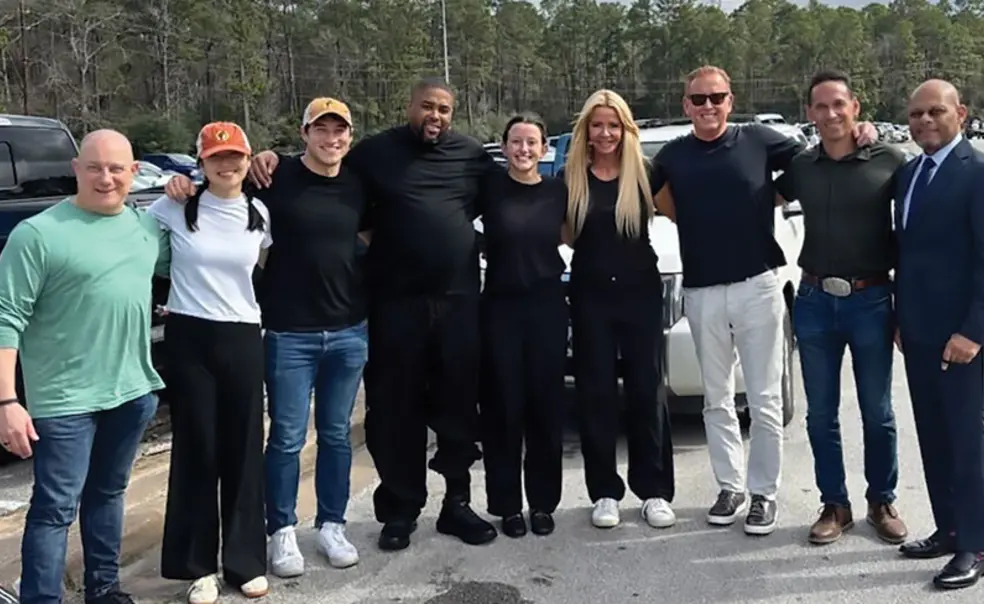Princeton’s Making an Exoneree Program Secures Third Release
On the morning of Feb. 5, Ben Bograd ’23, Kerrie Liang ’25, and Kennedy Mattes ’23 anxiously sat inside a car parked outside a Texas jail north of Houston, waiting for Ivery Dorsey to walk out. Over the last two years, the three Princetonians had been part of an effort to show Dorsey was wrongfully convicted of murder 18 years earlier — an effort spanning thousands of pages of documents and countless phone calls — and now, Dorsey was set to be released on parole.
“It was nerve-racking, to say the least,” Mattes recalled. “It didn’t feel real until we actually saw him walking out of the jail that morning.”
Around noon, Dorsey walked through the gates, becoming the third person to win his freedom as a result of Princeton’s Making an Exoneree program, a School of Public and International Affairs initiative that gives students hands-on experience in trying to overturn wrongful convictions. Dorsey follows Muti Ajamu-Osagboro and Anthony Mills, both of whom were released on parole.
“I would talk to them every day on the phone. You could feel like something different was happening. They came all the way into the foxhole with me.”
— Ivery Dorsey
on working with Princeton’s Making an Exoneree program
Bograd, Liang, and Mattes first met in the program’s pilot semester, held in the spring of 2023. In the months after they were assigned Dorsey’s case, the trio reviewed legal records, called Dorsey at least once a day, and flew down to Houston for four days to film a short documentary. “I would talk to them every day on the phone,” Dorsey told PAW. “You could feel like something different was happening. They came all the way into the foxhole with me.”
As the end of the semester approached, Bograd, Liang, and Mattes were clear about pushing forward with the case. “We had all formed such a deep relationship with Ivery that there was never any question about this ending,” Bograd said. “It was just going to take a different shape once we were graduating and going off on our separate ways.”
Indeed, working remotely posed a unique set of challenges. Bograd, for instance, began a yearlong fellowship in Beijing and couldn’t directly call into the Texas prison system with his international phone number. “I would send Ivery an email saying, ‘Please call my parents at this time,’ then I would call [my parents], and they’d patch me in,” Bograd recounted.
With the support of Princeton professor James Vreeland and Georgetown’s Prisons and Justice Initiative, the team decided to focus on preparing for Dorsey’s parole hearing; throughout the second half of 2023, the students compiled a 107-page parole packet detailing Dorsey’s readiness to be released. In January 2024, Bograd, Liang, and Mattes learned that Dorsey’s parole had been approved — but that he would have to complete a year’s worth of reentry programs, delaying his release until early 2025. “With every major win that we have with Ivery, we also have a lot of concessions,” Liang said. “On one hand, we were really excited that he was able to go home. But [we] also [felt] a lot of frustration with how difficult they made the process.”
Following Dorsey’s release, the team’s next goal is to work with his lawyer to secure an exoneration; the students are hopeful, given that another individual has confessed to the murder for which Dorsey was convicted. “We’ll still help out with the case in ways that we can,” Mattes said. “But now it’s [also about] having fun with Ivery, walking him through technology as he’s getting up to date on everything, and being there.”
Princeton’s Making an Exoneree program continues through two classes: the original course, now in its third year, and a new course, The Criminal Legal System: Advocacy and Freedom, which focuses on securing local releases in the wider New Jersey area.
“Oftentimes at Princeton, we’re told that our thoughts are really important; we’re going to be leaders, because we will be at the top of the food chain and making these big decisions,” Bograd said. “But I think that the only way you ever get to that point is by working really hard and getting into the nitty gritty of things. This class is the ultimate version of that.”










No responses yet